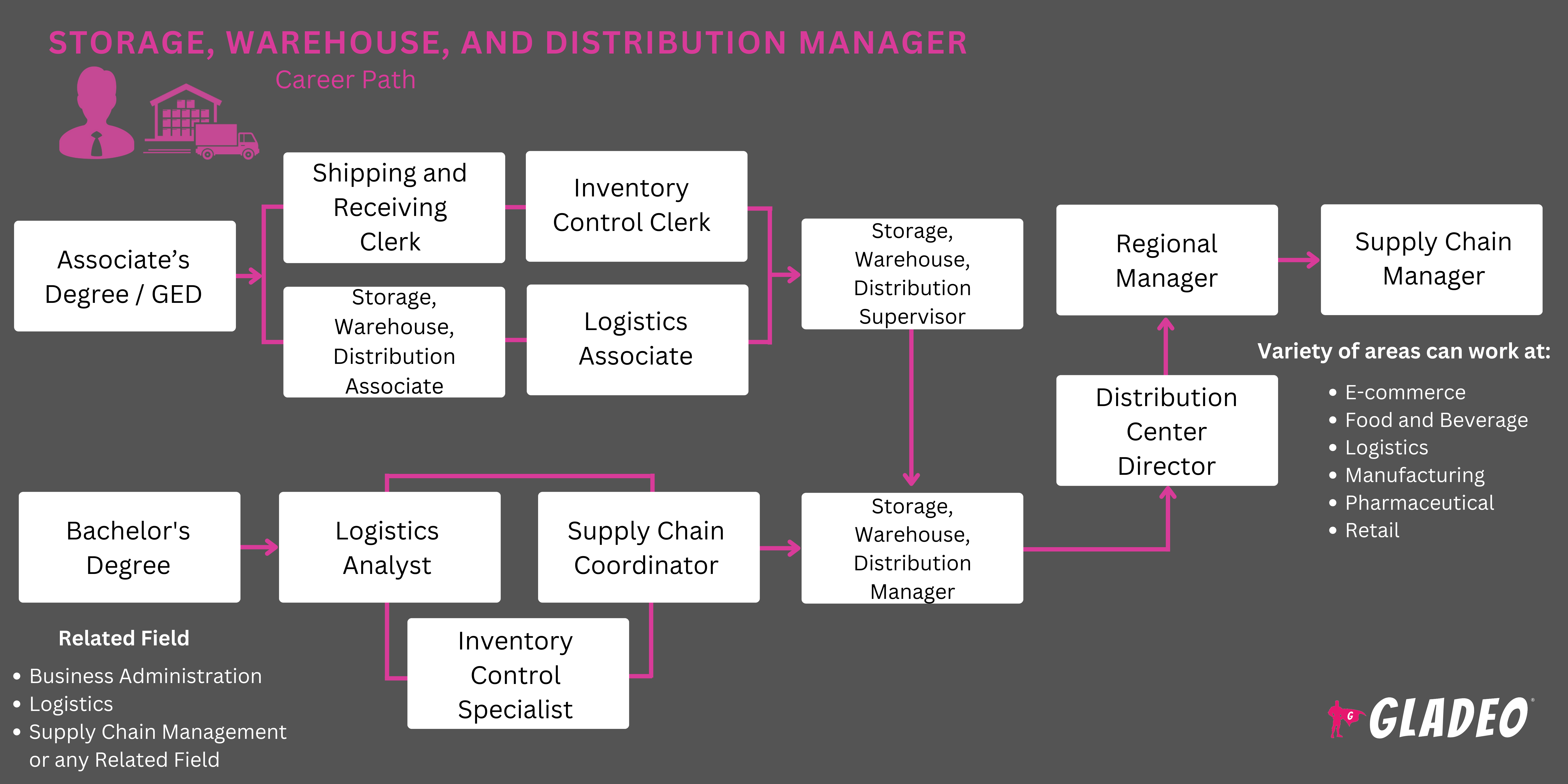스포트라이트
Distribution Center Manager, Distribution Manager, Fleet Manager, Global Transportation Manager, Logistics Director, Logistics Operations Manager, Shipping Manager, Supply Chain Logistics Manager, Transportation Manager, Warehouse Supervisor
Most of us never give a thought to where the products we use come from. They just seem to flow seamlessly from “somewhere” to our favorite stores or straight to our doorstep!
But unsurprisingly, there’s a vast, intricate supply chain network that makes that flow possible. At the center of it are Storage, Warehouse, and Distribution Managers who oversee the journey of goods from manufacturers to us, the consumers!
These multitasking managers ensure products are stored securely and easy to locate when it’s time to send them on their way. Without these experts overseeing logistical operations, modern businesses couldn’t meet consumer demands. Their tireless efforts underpin the foundation of our economy, ensuring goods are in the right place at the right time.
- Ensuring the smooth operation of supply chains
- Developing and implementing efficient storage and distribution strategies
- Contributing to the timely delivery of goods to customers
- Enhancing organizational efficiency and reducing operational costs
근무 일정
- Storage, Warehouse, and Distribution Managers typically work full-time, with shifts including early mornings, late nights, and/or weekends.
일반적인 의무
- Supervise storage, warehouse, and distribution workers
- Establish cost-effective storage, transportation, and distribution processes
- Develop policies and processes related to shipping and receiving, proper handling, workplace safety, security, theft deterrence, and emergency protocols
- Train workers and document training
- Inspect storage areas, warehouses, and vehicles. Ensure regular maintenance is being done per schedule
- Work with other department managers such as production, sales, customer orders, shipping processes, import and export, accounting, records, etc.
- Research potential problems and take action to mitigate them.
- Address problems that were unforeseen or unavoidable
- Regularly assess contractor and partner relations. Work with union officials as needed to ensure contract terms are met
- Prepare budgets. Review costs and potential areas for saving money
- Track inventory levels
- Monitor supply chain performance, metrics, customer satisfaction, and training records
- Propose ideas, changes, or suggestions for improvement, such as optimizing transportation routes
- Carry out unique customer requirements, as directed
- Routinely inspect invoices, manifests, work orders, and demand forecasts
- Negotiate with transportation carriers to obtain agreeable rates and terms
추가 책임
- Maintain compliance with tariff and customs regulations
- Procure suitable insurance coverage
- Manage warehouse management systems and other logistics software
- Respond to emails, phone calls, and other communications
promptly - Plan out facility or equipment upgrades
- Stay updated on industry trends and technological advancements
- Prepare and present reports on warehouse and distribution performance
- Ensure proper handling and storage of hazardous materials
소프트 스킬
- 분석
- 세부 사항에주의
- 의사소통 기술
- 고객 서비스
- 결단 력
- 신뢰성
- 디테일 지향
- 융통성
- 이니셔티브
- 대인 관계 기술
- 지도력
- 동기
- 고집
- 문제 해결 능력
- 팀워크
기술 능력
- Analyzing market trends
- Blockchain
- Budgeting and financial planning
- 규정 준수 소프트웨어
- 컴퓨터 지원 설계
- Data analysis and reporting
- 엔터프라이즈 자원 계획
- 재무 분석
- 지리 정보 시스템
- 위험 물질 취급
- 재고 관리
- Label making
- Logistics and distribution processes
- 프로젝트 관리
- RFID tags
- Route navigation programs (FleetSuite)
- 스케줄링 소프트웨어
- 스프레드시트
- 공급망 관리
- Transportation management systems
- 자동차 산업
- 전자 상거래 회사
- Food and beverage companies
- Grocery stores
- Healthcare organizations
- 제조 회사
- Retail chains
- 타사 물류 제공업체
- 도매 유통업체
Storage, Warehouse, and Distribution Managers are expected to ensure the smooth operation of complex logistics processes. This includes overseeing the receipt, storage, and dispatch of goods, maintaining accurate inventory records, and ensuring that safety standards are met. They’re also responsible for coordinating with suppliers, transporters, and other stakeholders to ensure timely, efficient distribution.
The job requires long hours, with weekend and holiday hours possible to meet tight deadlines and handle unexpected issues. The physical demands can be taxing, as managers often need to be up on their feet and moving around to check on things.
Their duties involve solving myriad problems, making quick decisions, and handling stressful situations like delays or discrepancies. Thus, they need a strong capacity for stress management and resilience!
The world of logistics is increasingly embracing automation via automated storage and retrieval systems, robotics, and AI-driven inventory management systems. Such technologies help improve accuracy, efficiency, and speed in handling and storing goods.
Another trend is the ever-growing emphasis on sustainability. Many warehouses are adopting green practices, such as using energy-efficient lighting, recycling programs, and eco-friendly packaging materials. There’s also a push towards optimizing routes and transportation methods to reduce carbon footprints.
E-commerce continues to shape the industry, driving the need for faster, more flexible distribution solutions. This has led to the rise of smaller, decentralized warehouses (such as Amazon’s network of fulfillment centers) to ensure quicker delivery times.
Storage, Warehouse, and Distribution Managers are very organized and may have enjoyed leading groups and solving problems when they were younger. They might have been involved in sports or activities that required teamwork and leadership.
- An associate’s or bachelor’s degree in logistics, transportation, supply chain management, business administration, operations management, or a similar field is usually needed
- College courses may include:
- Advanced Materials Handling
- Customer Relationship Management
- E-Commerce Logistics
- Freight and Logistics Management
- 재고 관리
- Procurement And Sourcing
- 품질경영
- Risk Management in Supply Chains
- Transportation and Distribution Management
- Warehouse Management Systems
- Managers may also need training in workplace safety regulations
- Some advanced positions may require a master’s in supply chain management or an MBA with a focus on logistics
- On-the-job training is common to learn about software systems, warehouse procedures, and safety protocols
- Prior experience as a warehouse worker, logistics coordinator, or inventory manager can be very valuable
- Professional certifications can boost one’s credentials later but may not be required to get started. Options include:
- American Purchasing Society - Certified Professional in Distribution and Warehouse Management
- Association for Supply Chain Management -
> Certified Supply Chain Professional
> Certified in Logistics, Transportation, and Distribution
> Certified in Production and Inventory Management
IWLA - Certified Warehouse Logistics Professional
- Manufacturing Skill Standards Council -
> Certified Logistics Technician
> Certified Technician - Supply Chain Automation & Skill Boss Logistics
- Look for accredited colleges offering associate’s or bachelor’s degree programs in logistics, transportation, supply chain
management, business administration, or a related field. - Seek programs with internships or opportunities to get practical experience.
- Make sure the school is accredited by a legitimate agency.
- 수업료 및 수수료 비용을 비교하여 주 내 비용과 타주 비용을 확인하세요.
- Review scholarship and financial aid options.
- Check out graduation and job placement statistics for alumni.
- In high school, study hard in classes related to business, logistics, supply chain, transportation, and economics to prepare for college
- Apply for part-time jobs in storage facilities and warehouses or at transportation companies
- Enroll in a college or university program in a relevant major, such as logistics, transportation, supply chain management, business administration, operations management
- Take courses to learn about market trends, blockchain technology, financial planning, computer-aided design, data analysis, geographic information systems, inventory management, logistics and distribution processes, route navigation programs, supply chain management, and transportation management systems
- Read articles and watch videos related to the field
- Participate in relevant online forums and discussion groups
- Reach out to working professionals to ask for an informational interview or permission to shadow them at work for a day
- 이력서를 위한 모든 업무 및 학업 성취도를 추적하세요.

- 인디드닷컴, 글래스도어, 집리크루터, USAJOBS 등의 구직 포털을 검색하세요.
- If you don’t have much experience, try to land an entry-level job in a warehouse, storage facility, or with a transportation firm
- See if there are any apprenticeship opportunities available in your area
- Review job ads and look for keywords to list on your resume. Common keywords may include:
- 재고 관리
- 물류
- Materials Handling
- Order Fulfillment
- 품질 관리
- 안전 규정 준수
- Shipping and Receiving
- Stock Control
- 공급망 관리
- Team Leadership
- Vendor Management
- Warehouse Management Systems (WMS)
- Connect with your professional network. Ask for leads on upcoming job openings
- 이전 교수 및 감독자에게 추천서를 작성하도록 요청하거나 참고인으로 등재하기 위해 사전에 동의를 구하십시오.
- Research potential employers. Learn about their mission and show enthusiasm and industry awareness during interviews
- Review Storage, Warehouse, and Distribution Manager resume templates
- Look for sample interview questions and run through some mock interviews with friends or your school’s career center. Sample questions might include:
- “Can you describe your experience with inventory management systems and how you ensure accuracy in inventory levels?”
- “How do you ensure that safety standards and compliance regulations are met in the warehouse?”
- “Describe a time when you implemented a process improvement in a warehouse setting. What was the result?”
- Focus on your current role but let your supervisor know you’re interested in future advancement opportunities
- Offer to take the lead on complex projects and demonstrate your ability to assume greater responsibility
- Knock out additional education and training such as the
Association for Supply Chain Management’s Certified in Logistics, Transportation, and Distribution or other certifications - If you have an associate’s degree, consider completing a bachelor’s. If you have your bachelor’s, go for a graduate degree such as a master’s in supply chain management or an MBA with a focus on logistics
- Establish a reputation for dependability, accountability, and preparedness
- Be a proactive problem solver who keeps things flowing smoothly and efficiently
- Build and maintain close long-term relationships with customers, vendors, suppliers, contractors, and other professionals you work with
- Stay active in professional engineering organizations such as the Institute for Supply Management
- 규정 변경에 대한 최신 정보를 파악하여 조직이 항상 규정을 준수할 수 있도록 하세요.
웹사이트
- 미국 교통 저널
- 공급망 관리 협회
- 공급망 관리 전문가 협의회
- CSCMP's Supply Chain Quarterly
- DC Velocity
- Food Logistics
- FreightWaves
- 인바운드 물류
- 공급 관리 연구소
- 유해 물질 관리 연구소
- 국제 창고 물류 협회
- Journal of Commerce (JOC)
- Logistics Management
- Logistics Quarterly
- Material Handling & Logistics
- MH&L
- NAFA Fleet Management Association
- National Freight Transportation Association
- National Industrial Transportation League
- 포장, 취급 및 물류 엔지니어의 국립 연구소
- National Private Truck Council
- Small Business Development Centers
- SOLE - The International Society of Logistics
- 북미 고형 폐기물 협회
- 국가 무역 수출 프로그램
- Supply & Demand Chain Executive
- 공급망 브레인
- Supply Chain Management Review
- Transport Topics
- 미국 중소기업청
- 미국 무역 개발청
- Warehousing Education and Research Council
Books - Arriving Today: From Factory to Front Door – Why Everything Has Changed About How and What We Buy, by Christopher Mims
- Principles of Supply Chain Management: A Balanced Approach, by Joel D. Wisner, Keah-Choon Tan, et al.
- Supply Chain Management For Dummies, by Daniel Stanton
Being a Storage, Warehouse, and Distribution Manager comes with a wide range of challenges, such as managing tight deadlines, handling complex logistics, and maintaining efficient inventory control. If you're interested in exploring new opportunities that might be a better fit, check out the suggestions below!
- 시설 관리자
- General and Operations Manager
- 가져오기/내보내기 전문가
- 산업 생산 관리자
- 물류 학자
- 물류 분석가
- 프로젝트 관리 전문가
- 구매 관리자
- 공급망 관리자
- 교통 플래너
- 트럭 운전사
- 도매 및 제조 영업 담당자
뉴스 피드

주요 채용 정보

온라인 과정 및 도구







